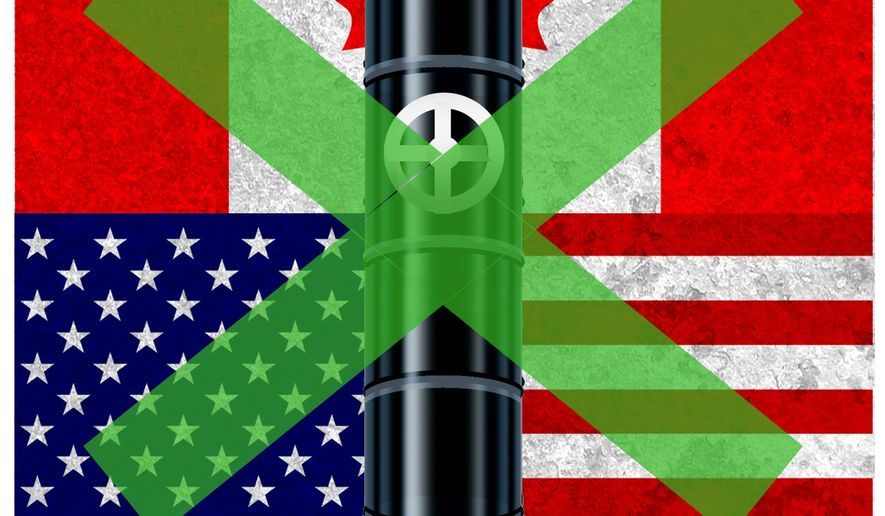OPINION:
After years of legal battles, President Biden pulled the plug on the Keystone XL oil transport pipeline on his first day in office. His reasoning? Combating climate change and putting America back into the Paris Accord.
But President Biden’s killing of the pipeline will not save the environment. Here’s what it will do: Hurt the environment and Americans alike in ways a pipeline never would have.
The Keystone XL pipeline would have carried Canadian oil from Alberta to Nebraska, where it would join other pipelines to transport the oil to refineries along the Gulf coast. And contrary to popular conception, transporting oil via the Keystone XL pipeline would have been environmentally preferable to its alternative: rail. Based on the frequency and volume of oil spills during transport, the International Association of Energy Economics found that transporting oil by rail is more environmentally risky than by pipeline.
And it’s not just fewer oil spills that make pipelines safer. Shipping oil through pipelines actually reduces the amount of carbon dioxide emissions associated with oil transport compared to rail by over 60%, according to University of Alberta research. After all, trains need their own fuel to run. Indeed, even the Obama administration found that, if approved, the Keystone XL pipeline would not lead to an increase in CO2 emissions. Moreover, to sweeten the deal, TC Energy — the company that would operate the Keystone XL pipeline — pledged to operate the pipeline entirely by green energy by 2030.
The pipeline needed to be constructed too, and this construction was poised to employ over 11,000 people with high paying jobs, paying out $1.6 billion in total wages. Over 8,000 of these would have been union jobs, but even the unions standing to benefit were unable to convince Mr. Biden to approve the pipeline’s construction.
In Nebraska alone, the project would have provided tens of millions of dollars each year in economic activity and tax revenue, let alone the other states it would have passed through. Negating such a boost to workers and state and local governments in the cash-strapped COVID-19 era is not an outcome to take lightly.
Cancelling the Keystone XL pipeline also has international implications. It achieves the double whammy of thumbing our noses at our closest ally while benefiting our competitors. Alberta’s premier called the decision insulting, describing it as “a gut punch for the Canadian and Alberta economies.”
Even Canada’s environmentally-conscious prime minister called Mr. Biden’s decision a disappointment. Considering that Canada sends 98% of its oil exports to the United States, these sentiments are hardly surprising. Additionally, Canada is also America’s largest energy trading partner — half of our oil imports originate in Canada.
Rather than pursuing greater continental energy security, blocking the pipeline gives a leg up to America’s competitors. The demand for oil at America’s refineries will not subside with less Canadian oil, and now those refineries could be forced to import more oil from OPEC nations such as Saudi Arabia and Iraq.
Mr. Biden’s blocking of the pipeline was made in the spirit of the Paris Accord, pledging to cut America’s CO2 emissions in an agreement former President Obama negotiated with nearly 200 countries. While this move would take its economic and environmental toll on America, the world leader in energy-related emissions reductions in the 21st century, it gives a free pass to countries whose Paris commitments do not require emissions cuts.
Russia’s emissions won’t peak for several years and its state oil company is continuing to explore for more oil, as its government sees oil production as key to determining the country’s place in the world. The Paris commitments of China, by far the world largest polluter, don’t require it to cut emissions for another decade.
Mr. Biden’s move to shut off the pipeline was surely made with domestic special interest groups in mind, but they do not come without consequences for America’s new era of competition with Russia and China. As if to rub salt in the wound, Mr. Biden also revoked oil and gas drilling permits on federal lands, which provide 10% of America’s supplies. Tying one hand behind America’s back makes our adversaries more powerful.
While Mr. Biden’s revoking of the Keystone XL pipeline’s permit was likely the final nail in the coffin for the project, a careful consideration of its benefits and contributions to America’s interests would have led to the opposite conclusion. Mr. Biden’s move was the wrong decision on all accounts. The environmental, economic, and international implications of cancelling the Keystone XL pipeline show that President Biden’s first decision was also his first mistake.
• Jakob Puckett is an energy policy analyst and an Associate Contributor for Young Voices.




Please read our comment policy before commenting.